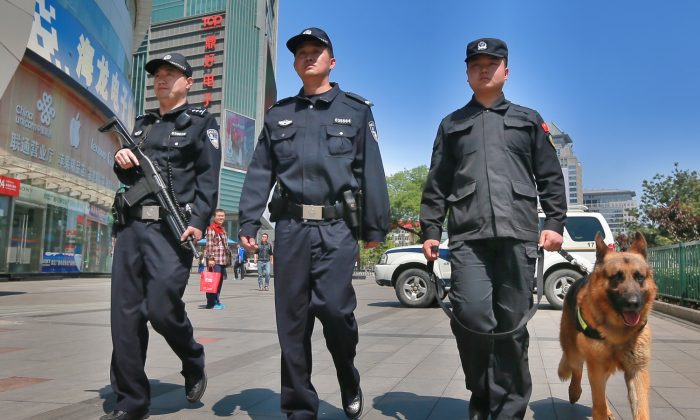The Chinese Communist Party (CCP) is threatening to fire police officers if they do not arrest enough people who uphold spiritual faiths—including Falun Gong and Christianity—according to a magazine that monitors religious freedom in China.
An officer in Dalian in northeastern Liaoning Province told the magazine, Bitter Winter the police station where he works received a “quarterly performance assessment plan to combat religious belief” from the CCP’s National Security Bureau in Sept.
It listed the minimum targets people of faith the police needed to arrest.
“The assessment is based on a 100-point evaluation system with specific scores assigned for each arrested believer, depending on his or her faith,” Bitter Winter reported.
People of all faiths are targeted, including Falun Gong practitioners, Christians, Uyghurs, and Tibetans.
The photo of the first page of the assessment plan as featured in Bitter Winter’s article maybe the first photographic evidence of arrest quotas for Chinese police.
The National Security Bureau in Liaoning’s Dalian city has set quotas of arrested believers for local police stations as part of their work assessment plan.
由 Bitter Winter 发布于 2018年11月1日周四
The page shows how in the case of Falun Gong practitioners, police are awarded 20 points if they arrest someone under the jurisdiction of the Ministry of Public Security, 10 points if the person falls under provincial level Public Security, and five points if their case is managed by the city-level public security.
The magazine revealed the “highest scores are given to the most persecuted religious movements,” which includes Falun Gong, a traditional spiritual practice that became popular in China in the 1990s.
Police Threatened With Dismissal
The police station chief can be fired from his role if the quarterly quotas are not met.
In an attempt to meet the quotas, police stations would distribute the names of previously arrested people to local communities and building managers, and ask them to report to police if they see these people engaging in “suspicious activities,” the article revealed.
In Dalian, officers are authorized to arrest any person of faith who owns three or more religious books and transfer them to the city’s National Security Brigade to be interrogated, the police officer said.
He told the magazine that although he does not want to arrest people who are innocent, he admittedly fears the consequences from his superiors if he does not comply with the targets allotted to him.
The officer said when a police station is not meeting the quotas, some police officers would resort to buying names of those arrested from other police stations that have surpassed the quotas, with each name costing about 500 RMB (about $70).
Minghui.org, a website dedicated to posting information about the persecution of Falun Gong, has previously reported admissions from police officers in 2017, 2016, and 2013, that they were subject to minimum targets to arrest Falun Gong practitioners.
Forced Labor, ‘Transformation’ and Death Quotas in Falun Gong Persecution
The CCP has persecuted Falun Gong since 1999 when then-CCP leader Jiang Zemin launched an extralegal, secret police called the “610 Office,” dedicated solely to carrying out the persecution.
Over the past two decades, Minghui has reported dozens to hundreds of cases where police were subject to quotas of how many practitioners of Falun Gong they had to detain in forced labor camps, force to relinquish the practice, and kill in any given year that would be written off as “normal deaths.”
The CCP seeks to forcefully convert adherents of Falun Gong, in a process commonly referred to as “transformation,” whereby the person has to cease and denounce their practice, as well as assist in “transforming” others.
“The intended outcome of this transformation campaign is the eradication of the practice amongst the living and the death of those not transformed,” read a peer-reviewed article published in 2018, headed by Canadian associate professor Dr. Maria Cheung that discusses the persecution of Falun Gong.
In 2004, Minghui reported a prison in Shenyang City, Liaoning Province, had an annual quota of 20 “‘normal deaths,’ which encourages police to torture Falun Gong practitioners without any restrictions.” The report is among several by Minghui that note the existence of “death quotas” given to police.
In a similar vein, police are given a quota of how many people need to be sent to “forced labor.” One example dates to 2011, when 50-year-old female farmer Zhong Zhaofen was arrested in Zhaoyuan City of Shandong Province and was subject to forced labor, among other abuses.
“We were given a quota of four forced labor sentences from our superiors. [This person] is just in time to be one of them,” the article quoted an officer in charge of Zhong’s case saying.
According to the peer-reviewed article by Cheung and her colleagues, “quotas for forced conversion are issued to local authorities who are incentivized to use any means necessary to achieve these targets, including coercive tactics such as forced-feeding, sleep deprivation, and shocks with electric truncheons.”

